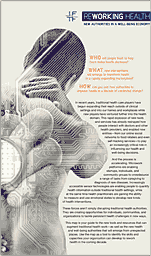Future Now
The IFTF Blog
Reworking Health: Activating Community Health Libraries
Lending programs become curators of health resources
 It could be that the hype around the sharing economy—using connected, digital platforms to rent out underused personal assets such as cars, apartments, parking spaces, expertise, spare time—is reaching its peak. In May, The Wall Street Journal columnist David Weidner joined a growing cadre of economists and analysts when he examined, “The Unique Risks of ‘Sharing Economy’ Companies,” and a June opinion piece posted on Time.com predicted that The Sharing Economy Boom Is About to Bust. Yet, perhaps it’s a recent headline from San Francisco’s The Guardian, a news entity that has reported substantially on the sharing economy, that best captures the public sentiment toward the disruptive business model today: “Uber and Airbnb show that the sharing economy is on its way—like it or not.”
It could be that the hype around the sharing economy—using connected, digital platforms to rent out underused personal assets such as cars, apartments, parking spaces, expertise, spare time—is reaching its peak. In May, The Wall Street Journal columnist David Weidner joined a growing cadre of economists and analysts when he examined, “The Unique Risks of ‘Sharing Economy’ Companies,” and a June opinion piece posted on Time.com predicted that The Sharing Economy Boom Is About to Bust. Yet, perhaps it’s a recent headline from San Francisco’s The Guardian, a news entity that has reported substantially on the sharing economy, that best captures the public sentiment toward the disruptive business model today: “Uber and Airbnb show that the sharing economy is on its way—like it or not.”
And while options to engage in what is also referred to as collaborative consumption or peer-to-peer lending or renting are relatively ample when it comes to vacation and transportation services, the shift away from ownership has not been felt as acutely in traditional health care models. Not yet, anyway.
As our forecast “Activating community health libraries” suggests, over the next decade, activated networks will leverage new social technologies to disrupt the models used for procuring durable medical equipment, such as wheelchairs and hospital beds. Infused with the learnings gleaned from existing sharing economy companies in other fields, new and established health care players will experiment with novel ways to support people in meeting their health needs and goals.
Already, early movers are launching new services to signal what sharing economy businesses might work in the health care space. Take Cohealo, for instance, a digital platform and logistic service to facilitate hospitals’ ability to share medical equipment. While still in the business of selling surgical equipment to hospitals, Cohealo’s founder Mark Slaughter suspected that an abundance of unused medical equipment was crammed into storage rooms in every hospital he served. To test his suspicion, Slaughter ran a tiny, but telling, experiment in which he tracked one piece of surgical equipment in a South Florida hospital for over six months. He found that the $120,000 device was actually in use only 25% of the time. The remaining 75% of the time (or 133 days out of the 181 that he tracked it), the expensive equipment sat idle, taking up space in a closet or hallway. He launched Cohealo to help health systems share these underutilized resources.
But this approach is not limited to physical items. The mobile platform HelpAround is working to empower a “Diabetes Safety Net” by connecting users to others in the area who might be able to provide missing supplies, and also to people who can help with a blood test or an injection. Recently, Forbes listed HelpAround as one of 10 Health Tech Companies Changing the World.
A 2013 Economist article on “This Rise of the Sharing Economy” concludes with the following warning: “This emerging model is now big and disruptive enough for regulators and companies to have woken up to it. That is a sign of its immense potential. It is time to start caring about sharing.” Perhaps more health care stakeholders may want to start caring about sharing, too.
In our 2013 Health Horizons research, Reworking Health, we examined four emerging sources of authority—computation, narratives, networks, and ambience—that will fundamentally transform who we trust and what interventions will be available in a rapidly expanding health and well-being marketplace.
This series of blog posts dives into the map's forecasts to reveal new opportunities and help you imagine what skills and capacities you or your organization can develop to rework health in the coming decade:
- Automating Media Therapy
- Amplifying the Positive
- Commoditizing Bodywork
- Optimizing the Care Effect
- Uncovering Empowering Identities
- Coordinating Caring Communities
- Calibrating Pain
About IFTF's Health Horizons Program
- Contact Dawn Alva at dalva@iftf.org or 650-233-9585



